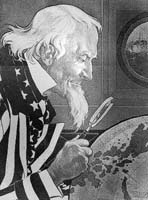
American History Defined by "One Nation Under God" Bias
by Paul Blaum
 |
by Paul Blaum |
|
 During
the 19th century, many White Americans used religion to create an identity as a new chosen people with a divine commission to convert non-White Americans into Christians and thus one hundred percent Americans, according to a Penn State sociologist of religion.
During
the 19th century, many White Americans used religion to create an identity as a new chosen people with a divine commission to convert non-White Americans into Christians and thus one hundred percent Americans, according to a Penn State sociologist of religion.
As early as the American Revolutionary War and the War of 1812, Americans, then far more ethnically homogenous, started thinking of themselves as a new, improved version of the English Anglo-Saxons, says Dr. Daniel B. Lee, assistant professor of sociology at Penn State. Since Anglo-Saxon England had allegedly become morally and politically corrupt, its former colonists in America were now poised to take up England's mantle as the superior civilization. Within a few decades, this view resulted in the doctrine of Manifest Destiny, which stressed the right of the United States to dominate the Western Hemisphere, the sociologist says. This perception was challenged first by the American Civil War, which freed millions of African-American slaves and the Western frontier movement, which brought White America face to face with the American Indians. Finally, the massive immigration of Eastern and Southern Europeans, including numerous Jews from Russia, Poland and elsewhere, forced White Americans to reassess their own identity and the very meaning of being an American, Lee notes. "To make sense of the changing world of race, Whites in Victorian America turned toward religion, engaging in a double fantasy," says Lee in a paper presented Aug. 19 at the annual meeting of the American Sociological Association. "On the one hand, they were convinced that God had given them a common identity, history and mission for the future which would transcend all social distinctions among White Americans," Lee says. "As one nation under God, White America would act as the heroic defender of Christianity, democracy and civilization on Earth. On the other hand, Whites were also convinced that they knew the identity, history and future of all other races and religions. Many White Americans had the desire and assumed that they possessed the power to form other races in their own image." This type of thinking was proclaimed not only from the pulpit but also by public speakers in lecture halls and in popular magazines intended for reading in the home. The ultimate message was that all races were destined to convert to Christianity and at the same time evolve into White Anglo-Saxons, the two necessarily going together, the Penn State sociologist notes. The double fantasy of White Americans was doomed after a few decades to collide with social realities. Lee says. By the end of the 19th century, Lee says, Whites were forced to acknowledge their own political, class, gender and religious diversity. "Furthermore, many non-White Americans were demonstrating that they were not willing to confirm to the fantasy of Anglo-Saxons," says Lee. "Not everybody was willing to hop into the melting pot. Even Blacks who embraced the concept of racial integration did not expect to lose their identity." Both White and Blacks, however, were to be disappointed in their expectations of an eventual homogeneity of race. The construction of White America as opposed to all the non-White Americas, a development of the 19th century, is still with us at the dawn of the 21st century, Lee notes. "White identity, as understood by contemporary Americans, was defined largely in the 19th century and continues to be a major part of the social and political landscape due to the plasticity and emptiness of those concepts which support it," he adds.
Albion Monitor
August 31 2002 (http://albionmonitor.net) All Rights Reserved. Contact rights@monitor.net for permission to use in any format. |